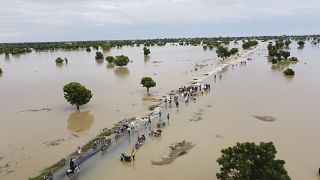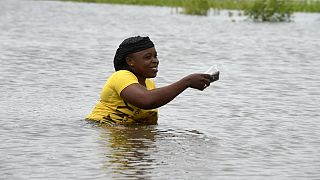Nigeria
The death toll in Nigeria’s worst floods in a decade has risen.
Some 600 people were confirmed dead Sunday, the Nigerian minister for Humanitarian Affairs, Disaster Management and Social Development announced during a media briefing.
2,407 persons have been injured, a total of 2.5 million people have been affected and 82,053 houses have been completely damaged.
Minister Sadiya Umar Farouq called on the "State governments, local government councils and Communities to prepare for more flooding by evacuating people living on flood plains to high grounds, provide tents and relief materials, fresh water as well as medical supplies for a possible outbreak of water-borne disease".
Since the end of July, the West African country has been grappling with a wave of flooding.
So far, floods have affected 31 of Nigeria's 36 states.
Many roads and other key infrastructure were destroyed.
The federal government announced last week it had started delivery of food items to disaster-stricken communities.
Why so much flooding?
In addition to a harsh rainy season and overflowing rivers, floods were also caused by the release of water from several damns (the process was meant to prevent excessive flooding).
The release of excess water from Cameroon’s Lagdo dam was for instance blamed.
Nigerian minister for Humanitarian Affairs, Disaster Management and Social Development announced that the Permanent Secretary of the Ministry Dr Nasir Sani Gwarzo, was "to lead a delegation to Cameroon next month, to discuss the periodic opening of the Lagdo dam with the authorities".
According to the minister, "metrological Agencies are warning that [Editor's note: Southern] States like Anambra, Delta, Cross River, Rivers, and Bayelsa are still at risk of experiencing floods up till the end of November."
The World Food Programme and the UN's Food and Agriculture Organization said last month that Nigeria was among six countries facing a high risk of catastrophic levels of hunger. So far, 332,327 hectares of farmland have been destroyed sparking food-security fears.












00:47
Ghana: President Mahama suspends Chief Justice Gertrude Torkornoo
Go to video
Police rescue 33 West Africans from a human trafficking scam in Ivory Coast
Go to video
Pope Francis' funeral scheduled Saturday April 26
Go to video
Funeral held in Kenya for TikTok content moderator
Go to video
Al-Qaida-linked militants attack a strategic town in Somalia
Go to video
Trump administration threatens Harvard over foreign student visas and protest ties